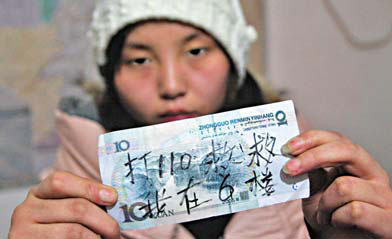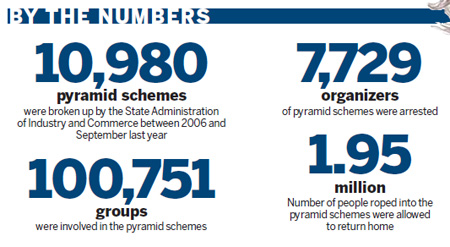InfoGraphic
Going against the slippery slope of a pyramid scheme
By Hu Yongqi (China Daily)
Updated: 2010-07-29 15:08
 |
Large Medium Small |
|
 |
|
Li Min shows how she used a bank note to save her from a pyramid scheme in Loudi, Guizhou province. [Guo Guoquan / for China Daily] |
None of Li's office neighbors know what is going on in the apartment and those who work in the office never divulge details of their families or friends because there is always the possibility that the ringleaders of pyramid schemes will attack them or their loved ones.
"Scammers hate us and will retaliate if they know where we live," Li said.
A pyramid scheme usually involves selling a fraudulent or substandard product or service, while in some cases the operators simply levy membership fees from recruits in order to capitalize the operation, without delivering any kind of product.
According to the State Administration of Industry and Commerce (SAIC), between 2006 and September last year, it was responsible for identifying and breaking up 10,980 pyramid schemes. They involved 100,751 groups and resulted in 7,729 organizers being arrested. About 1.95 million people roped into the schemes were allowed to return home.
At the beginning of this month, in Nanning, the capital of Guangxi Zhuang autonomous region, 29 pyramid schemes were busted and 130 organizers were arrested, while the 1,306 participants found in the organizers' apartments were sent back to their homes.
|
||||
Both organizations rely on donations and have running costs of about 120,000 yuan ($17,700) a year. More than 5,000 families of former victims have provided donations ranging from 200 yuan ($30) to 20,000 yuan.
Chen Hongsheng, president of Jet-Tern Co Ltd from Taiwan, made the most generous donation of more than 20,000 yuan to the association, after it saved one of his employees. Another anonymous victim who donated 500 yuan said, "They deserve more."
"The biggest problem is that we don't have the right to raise funds," Li said, adding his organization was only permitted to receive unsolicited donations.
For an organization to be legal and have the right to raise funds it must register with the Ministry of Civil Affairs and have an official supervisor.




